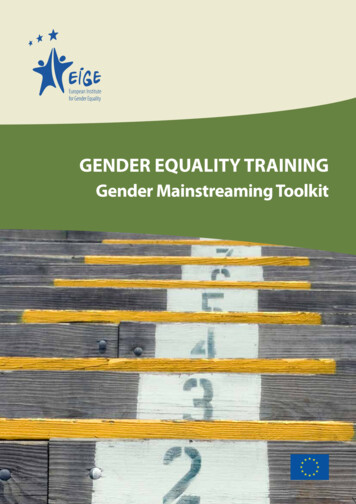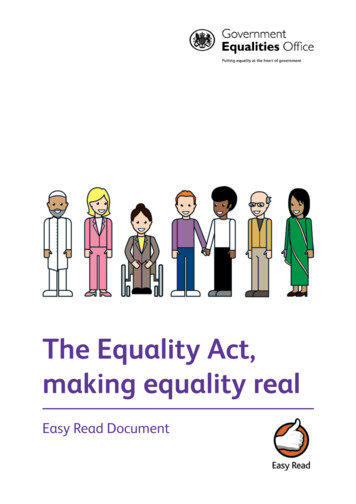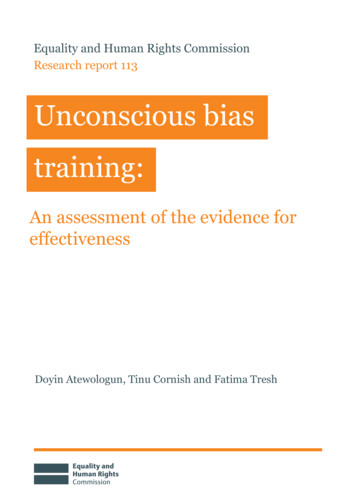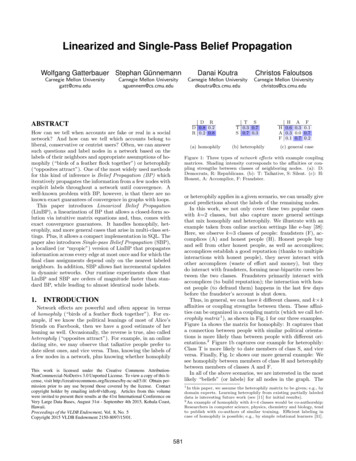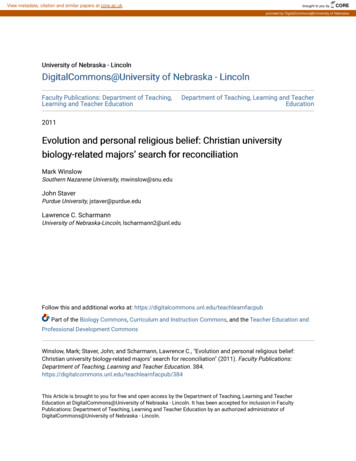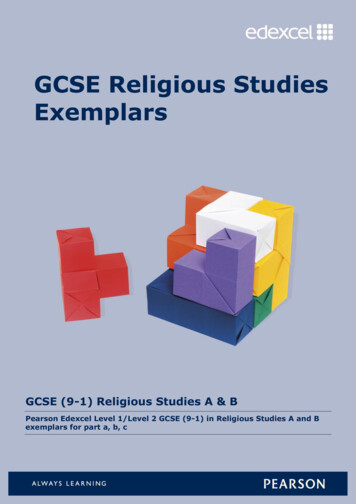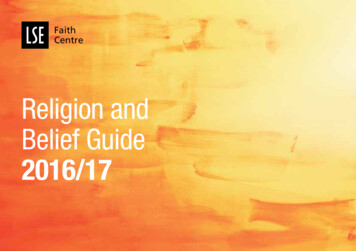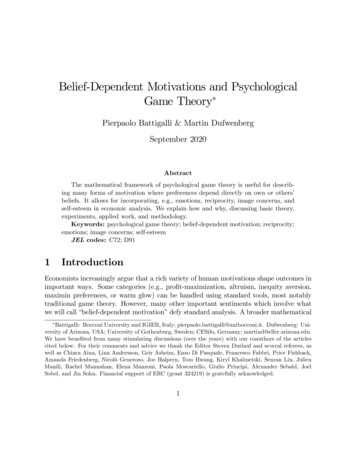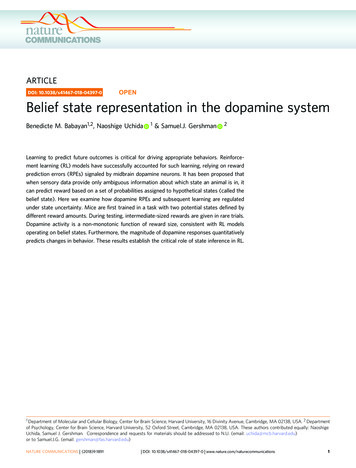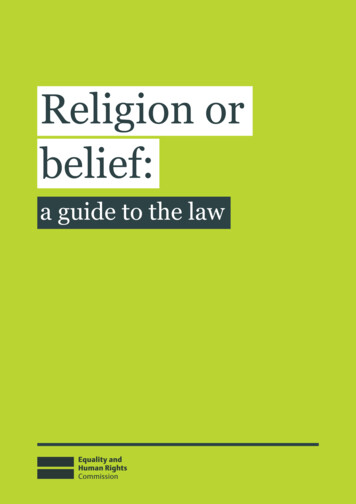
Transcription
1Religion or belief: a guide to the lawReligion orbelief:a guide to the law
2Religion or belief: a guide to the lawAbout this publicationWhat is the aim of this publication?‘Religion or belief: a guide to the law’ provides an overview of the protections offered bythe Equality Act 2010 and the Human Rights Act 1998 of people with or without a religionor belief. It answers commonly asked questions such as what is indirect discriminationand can it ever be justified, and how much employers are expected to know aboutreligion or belief in order to fulfil their legal obligations.Who is it for?This guide is for employers across the private and public sectors.Why has the Commission produced this?The Equality and Human Rights Commission is a statutory body established under theEquality Act 2006 to encourage equality and diversity, eliminate unlawful discrimination,and protect and promote human rights.
3Religion or belief: a guide to the lawEquality Act 2010The Equality Act 2010 makes it unlawful to discriminate against someone becauseof religion or belief, or because of a lack a religion or belief. For example, the Actprotects Christians if they are discriminated against because of their Christian beliefs.It also protects those who are discriminated against because they are not Christians,regardless of whether they have another religion or no religious belief.The Act applies to all aspects of employment, the provision of goods, services andeducation, the use or the disposal of premises, the exercise of public functions, andthe treatment by an association of its members and guests.It applies to all employers and service providers, whether they are public or privatesector bodies, and regardless of their size. It protects employees and other workersagainst discrimination in selection for employment, during employment, in dismissaland post-employment. It similarly protects actual or potential service users againstdiscriminatory treatment by service providers. It explains the different kinds of unlawfuldiscrimination, such as direct discrimination, indirect discrimination, harassment andvictimisation. Finally, the Act sets out some exceptions to the normal rule againstnon-discrimination. For example, it explains when it is not unlawful to specify thatapplicants for a job must have a particular religion or belief.For more detailed explanation of how the Act applies to employment and serviceproviders, see the Equality and Human Rights Commission’s Statutory Code ofPractice on Employment and Statutory Code of Practice on Services, PublicFunctions and Associations.Human Rights Act 1998The Human Rights Act 1998 says that all public authorities and other bodiescarrying out public functions, such as care services, have to act consistently withthe European Convention on Human Rights. One of these rights, Article 9, protectsfreedom of thought, conscience and religion. It protects all religions and a widerange of philosophical beliefs including atheism, humanism, agnosticism, veganismand pacifism.Article 9 gives all individuals an absolute right to hold or change a particular religion orbelief. It also says that people have a ‘qualified’ right to manifest that religion or belief,for example in the way they dress or behave. Because the right to manifest a religionor belief is qualified it can be limited in some situations, such as to protect publicsafety and the rights and freedoms of others.For example, it would be lawful for a hospital to have a policy restricting the kind ofreligious jewellery staff can wear on wards if the aim of the policy is to protect thehealth and safety of patients, and these restrictions are proportionate to that aim.
4Religion or belief: a guide to the lawI am a private sector employer – must I comply withthe Human Rights Act 1998?If you are a private sector employer carrying out public functions – for example, asecurity firm contracted by a public body to transport prisoners – then the HumanRights Act applies directly to you when carrying out those public functions. If youdo not exercise public functions then the Act applies indirectly as the courts have tointerpret UK laws to comply with Article 9 wherever possible. For example, when anemployment tribunal is deciding whether a private sector employer has discriminatedagainst an employee because of religion or belief, it will use Article 9 to help it decidehow the Equality Act 2010 should apply to the case.Which religions are protected by the Equality Act 2010?The Act says that ‘religion means any religion’, but doesn’t include a definition of religion.The courts have interpreted this as including any religion of sufficient seriousness whichhas a clear structure and belief system.The Act therefore protects religions such as Christianity, Judaism, Islam and Hinduism,as well as others such as Baha’i, Jainism, Rastafarianism and Zoroastrianism. A religionneed not be mainstream or well known to be protected under the Act.In addition, denominations or systems of belief within religions, such as Methodism orSabbatarianism within Christianity, or Sunni or Shia within Islam, are likely to be religionsfor the purposes of the Act.The Act says that ‘religion includes a lack of religion’. This means that people withouta religion, such as atheists, humanists and secularists, are protected under the Act.It also means that a person who has a particular religion will be protected if they arediscriminated against because they lack another, different religion.
5Religion or belief: a guide to the lawWhich beliefs are protected by the Equality Act 2010?The Act does not include a definition of belief other than ‘belief means any religious orphilosophical belief’ and includes a lack of a particular belief. The courts have developeda definition of belief through the cases they have decided.A belief need not include faith or worship of a god or gods, but it must affect how aperson lives their life or perceives the world.For a philosophical belief to be protected under the Act it must: be genuinely held be a belief and not just an opinion or viewpoint based on the present state ofinformation available be about a weighty and substantial aspect of human life and behaviour attain a certain level of cogency, seriousness, cohesion and importance, and be worthy of respect in a democratic society, not incompatible with human dignity andnot in conflict with fundamental rights of others. For example, Holocaust denial, or thebelief in racial superiority are not protected.Beliefs such as humanism, pacifism, vegetarianism and the belief in man-made climatechange are all protected.
6Religion or belief: a guide to the lawWhat is direct discrimination because of religionor belief?Direct discrimination is when someone is treated worse than someone else in a similarsituation because of religion or belief. For example, an employer refuses to employ a jobapplicant because they are Buddhist even though they are the best-qualified candidate.It is also direct discrimination if someone is treated worse than someone else in asimilar situation because they lack a particular religion or belief. For example, an atheistemployee is always given a lower bonus than Christian colleagues despite performing atleast as well as those colleagues.What is discrimination by association?It is unlawful direct discrimination to treat someone worse than someone else ina similar situation because of their association with another person who has a particularreligion or belief. That applies even if the person who is treated worse does not sharethat religion or belief. For example, a restaurant refuses a couple who are not Hindusa table because they are with a Hindu couple. The Hindu couple would have a claim ofdirect discrimination because they are refused a table due to their religion. The othercouple could also bring a claim of direct discrimination because they have been refuseda table due to their association with the Hindu couple.What is discrimination by perception?It is unlawful direct discrimination to treat someone worse than someone else in a similarsituation because they are perceived to have a particular religion or belief. For example,an employer wrongly assumes a job candidate is a Muslim because of their nameand rejects their application on this basis. The candidate will be able to claim directdiscrimination even though they are not in fact a Muslim.The same will apply if the reason for someone being treated worse is a perceived lackof a religion or belief.Can direct discrimination be legally justified?No it cannot, unless there is an explicit exception in the Act. These exceptions rarely apply.For example, the Act says that in certain very limited circumstances it is not unlawfuldirect discrimination to specify that having a particular religion or belief is anoccupational requirement for a job. If the occupational requirement exception appliesit would not be unlawful to refuse to employ someone because they do not have thespecified religion or belief. The Act also allows exceptions to the general rule againstdirect discrimination in the provision of services. For example, non-commercial religionor belief organisations may restrict those to whom they provide goods and servicesso long as certain legal conditions are met.
7Religion or belief: a guide to the lawBecause these are exceptions to the fundamental principle that direct discriminationis unlawful, the Act sets out strict conditions which have to be met before they canbe used.What is indirect discrimination in relation to religionor belief?Indirect discrimination occurs where a provision, criterion or practice – such as a ruleor policy – is applied to everyone but particularly disadvantages a group of people whoshare a certain religion or belief as well as a particular person in that group. An examplewould be a fitness centre requiring all personal trainers to wear a uniform that includesshorts, and no alternative is provided. This may conflict with some people’s religiousbeliefs about modesty in dress and would potentially indirectly discriminate against anemployee in that group who shares those beliefs.A provision, criterion or practice which has that effect will be unlawful unless it can beshown to be objectively justified.Can indirect discrimination be justified?Yes. A rule or policy that has an indirectly discriminatory effect is not unlawful if it isobjectively justified. This means satisfying a court or tribunal that the provision, criterionor practice is a proportionate means of achieving a legitimate aim.
8Religion or belief: a guide to the lawWhat is a legitimate aim?In most cases it will be possible to show that a potentially indirectly discriminatoryrule has a legitimate aim. Almost all genuine organisational needs will meet this test.Examples which have been accepted by the courts include the need to: protect the health and safety of fellow employees, customers or service users provide sufficient staff cover to meet contractual or legal requirements have sufficient staff cover to meet business demands maintain a brand or company image ensure neutrality in delivering public services, and ensure compliance with equal opportunities policies.The courts have said that cost alone cannot be a legitimate aim, but costs in additionto another factor can. This means, for example, an employer cannot justify an indirectlydiscriminatory rule simply by arguing that it is cheaper to discriminate.What might be a proportionate means of achieving alegitimate aim?What is proportionate will depend on the facts in each situation. It involves a court ortribunal balancing the effect of the rule or policy against the reasons for applying it. Inpractice, a central question is often whether there is an alternative way of achievingthe aim of the rule or policy which doesn’t have the discriminatory impact, or whichlessens it.For example, an employer requires all employees to work on Sundays. An employee asksnot to work on Sundays for religious reasons as this would disadvantage them and otherswho share their religion. In these circumstances the employer would need to consider: the impact on the business if the rule is not applied to this employee (for example,work rotas may be flexible enough to allow employees to swap Sunday working forother shifts so there is no real impact on the business) the impact on the employee’s colleagues, who may have to cover additional duties,and the costs, the effect on resource allocation and the other implications of agreeing tothis request.The more serious the consequences for the employee, the greater the onus on theemployer to find a way of granting a request. For example, if an employee will be forcedto resign due to being unable to comply with the rule to work Sundays, a court willrequire good evidence from the employer that alternative ways of achieving the aim ofthe rule requiring Sunday working could not be found.
9Religion or belief: a guide to the lawTo show that the rule is objectively justified, it is not enough for an employer or serviceprovider just to show that it acted reasonably. But, in practice, it will be easier foran employer to show that there was objective justification for a rule where stepswere taken to investigate and seriously consider the options at the time the requestwas made.What is harassment related to religion or belief in theworkplace?Harassment occurs where an employer or employee engages in unwanted conductrelated to religion or belief (or lack of a religion or belief) which has the purposeor effect of violating another person’s dignity or creating an intimidating, hostile,degrading, humiliating or offensive environment for that person. The Act makes twotypes of harassment related to religion or belief unlawful.The first is when somebody intends to harass another employee. For example, amember of staff has set up a weekly interfaith group for all employees and regularlycriticises all members of staff who decide not to attend, warning them of theconsequences of not having any particular religion or belief.The second is when the unwanted conduct is not intended to harass others but hasthat effect. This means that it is not necessarily a defence to a harassment claimto say that the harasser ‘did not mean it’. The Act itself sets out the relevant factorsin deciding whether conduct has a harassing effect. These are the perception ofthe person being harassed, the other circumstances of the case and whether itis reasonable for the conduct to have that effect. This means that not all conductconsidered as harassment by an employee will be unlawful.For example, an employee who is a strong believer in man-made climate changeis offended by comments made by a colleague disputing the reality of man-madeclimate change during a discussion. The colleague does not intend to harass him butthe employee claims that the comments create an intimidating, hostile, degrading,humiliating or offensive environment for him. The comments will only be unlawfulharassment if it is reasonable for the comments to have that effect. In this example,that is unlikely to be the case. The comments are part of a one-off discussion betweencolleagues. The situation could be different if the colleague made repeated commentsto the employee ridiculing his belief or if the comments were expressed in particularlyderogatory language.An employer is liable for harassment by their employees unless it can show it took allreasonable steps to prevent it, for example by having clear policies setting out whatbehaviour is unacceptable and training its employees on those policies.
10Religion or belief: a guide to the lawAre the harassment provisions in the Act relevantwhen delivering a service?No. The harassment provisions in the Act do not apply to religion or belief in services orpublic functions. For example, a Muslim man visits his local takeaway regularly. Everytime he goes in, one of the staff makes comments about him not eating pork. He findsthis offensive and upsetting. As staff make the comment when delivering a service tohim he would not be able to bring a claim of harassment under the Act. However, thosecomments are likely to amount to direct discrimination if he can show he was treatedworse in the way the service was provided because of religion or belief.What is victimisation related to religion or belief inthe workplace?Victimisation in the workplace occurs when someone suffers a detriment as a resultof having complained about discrimination or of having helped someone else with adiscrimination claim. For example, an employee complains that her religious employerhas discriminated against her because she has no religion or belief. At a later date, theemployee is turned down for promotion because, although she has all the necessaryskills and experience, she is seen as a ‘troublemaker’. If the employee can show thatshe has been turned down because of her earlier complaint about discrimination, thiswould be victimisation under the Act.
11Religion or belief: a guide to the lawWhat is victimisation related to religion or beliefwhen delivering a service?Victimisation in service delivery is where someone suffers a detriment as a result ofhaving complained about discrimination or of having helped someone else with a claim.For example, a customer is barred from a restaurant because she previously alleged thatwaiting staff treated her less favourably because of her particular religion. The customercould bring a claim against the service provider for discrimination and victimisation underthe Act. So could someone else who complained about the discriminatory treatment ofthe customer and who was also barred from the restaurant as a result.Do I need to be an expert on religion or belief tofulfil my legal obligations as an employer orservice provider?No, employers and service providers are not expected to be experts in religion or beliefissues. However, you will in some circumstances need to understand enough about areligion or belief to enable you to make a decision about what you need to do to complywith the Equality Act 2010. For example, if an employee asks for a change to a dresscode for religious reasons you will need to understand why this is being asked for, whatthe change is and the consequences if it cannot be made. Unless you understand thesefactors you will not be able to take them into account in assessing whether it would beindirectly discriminatory not to allow the change. This does not mean you need to be anexpert in religion or belief but it does mean that you will need to ask the employee aboutthese issues.What is the Public Sector Equality Duty (PSED) andhow does this relate to religion or belief?The Public Sector Equality Duty (PSED) applies to all public bodies and otherorganisations carrying out public functions. It is made up of a general equality dutysupported by specific duties. The general duty is the same for England, Scotland andWales, but the specific duties for each of these three countries are different. The generalduty requires those carrying out public functions (for example, a security firm contractedby a public body to transport prisoners) to have due regard to the need to: eliminate unlawful discrimination, harassment or victimisation and other conductprohibited by the Act advance equality of opportunity between people who share a protectedcharacteristic and those who do not, and foster good relations between people who share a protected characteristic and thosewho do not.
12Religion or belief: a guide to the lawThis means organisations covered by the duty must integrate considerations of equalityand good relations into their day-to-day business. The PSED applies to the protectedcharacteristic of religion or belief. Having due regard to advancing equality of opportunitymeans a public body must consider the way in which the needs of people with differentprotected characteristics might be met or how barriers that prevent them from equality ofopportunity in employment or access to public services could be removed. Having dueregard to the need to foster good relations means a public body must consider how totackle prejudice and promote understanding between different groups.The duty therefore requires public bodies to consider how they could positivelycontribute to the advancement of equality of opportunity for and good relations betweenpeople of different religions and beliefs. It requires this to be considered in the design ofpolicies, including those that are internal, and the delivery of services, and for these tobe kept under review. The duty does not require a public body to meet all of the specificneeds of different groups.For more information on the PSED, please see our guidance.
13Religion or belief: a guide to the lawContactsThis publication and related equality and human rights resources are available fromthe Commission’s website: www.equalityhumanrights.comFor advice, information or guidance on equality, discrimination or human rightsissues, please contact the Equality Advisory and Support Service, a free andindependent phone0808 800 0082Textphone0808 800 0084Hours09:00 to 19:00 (Monday to Friday)10:00 to 14:00 (Saturday)PostFREEPOST Equality Advisory Support Service FPN4431Questions and comments regarding this publication may be addressed to:correspondence@equalityhumanrights.com.The Commission welcomes your feedback.Alternative formatsThis publication is also available as a Microsoft Word file fromwww.equalityhumanrights.com. For information on accessing aCommission publication in an alternative format, please contact:correspondence@equalityhumanrights.com. 2016 Equality and Human Rights CommissionPublished November 2016ISBN: 978-1-84206-684-3
14Religion or belief: a guide to the lawYou can download this publication fromwww.equalityhumanrights.com 2016 Equality and Human Rights CommissionPublished November 2016ISBN: 978-1-84206-684-3
A belief need not include faith or worship of a god or gods, but it must affect how a person lives their life or perceives the world. For a philosophical belief to be protected under the Act it must: be genuinely held be a belief and not just an opinion or viewpoint based on the present state of information available
